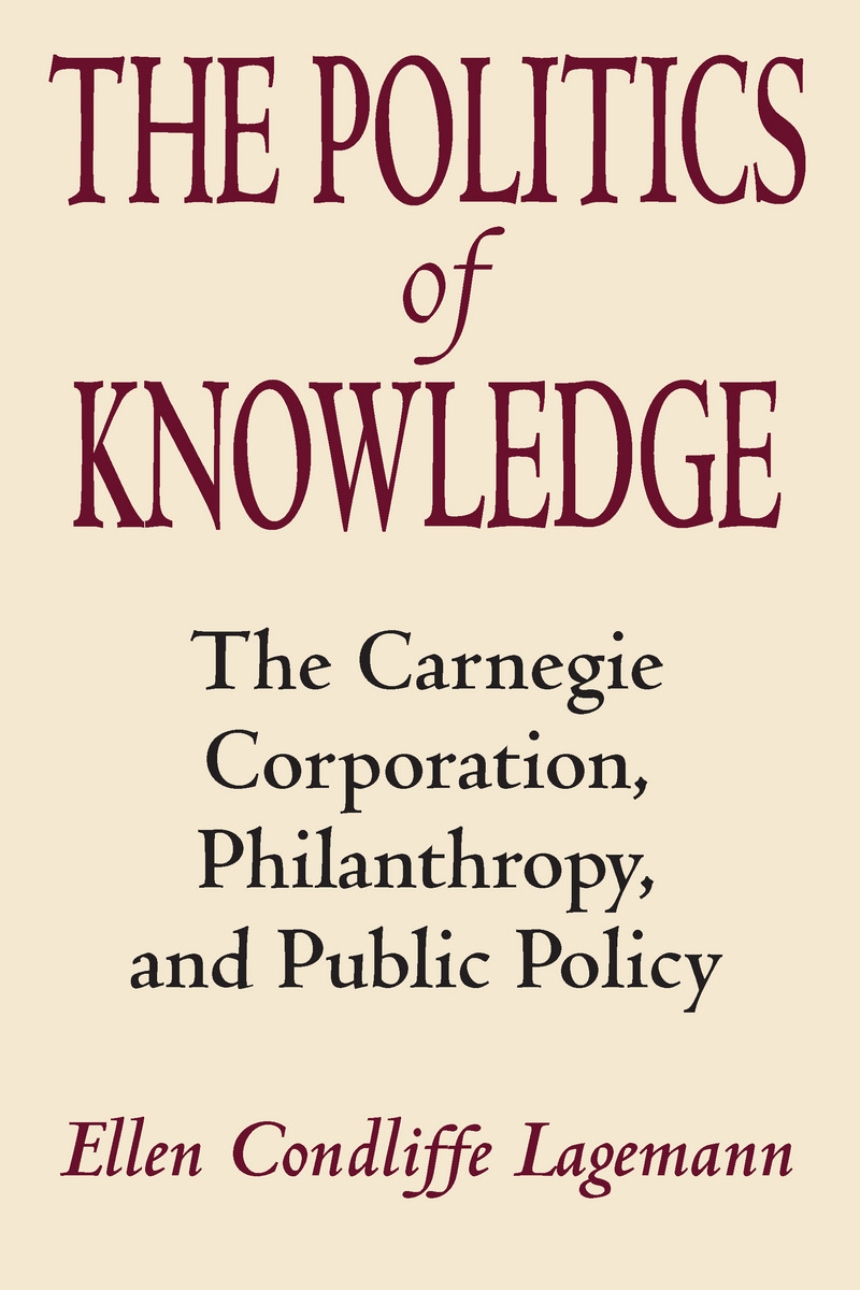The Politics of Knowledge
The Carnegie Corporation, Philanthropy, and Public Policy
The Carnegie Corporation, among this country’s oldest and most important foundations, has underwritten projects ranging from the writings of David Riesman to Sesame Street. Lagemann’s lively history focuses on how foundations quietly but effectively use power and private money to influence public policies.
364 pages | 6 x 9 | © 1992
Education: Education--Economics, Law, Politics, Education--General Studies
History: American History
Table of Contents
Preface
Introduction. The Politics of Knowledge
1. Liberal Commitments
From Politics to Philanthropy
Sweetness and Light
The Administration of the Carnegie Corporation
I. Scientific Philanthropy
2. A Clearinghouse of American Science: The National Research Council
George Ellery Hale and the National Academy of Sciences
James McKeen Cattell and the AAAS’s Committee of One Hundred
The National Research Council
Elihu Root: Hale’s "Valued and Beloved Adviser"
3. Propaganda or Research?: Creating an Institute of Economics
The Early Debates: "Propaganda" of "Research"
The Founding of the National Bureau of Economic Research
Carnegie Corporation Grants to the NBER
Additional Grants and Indirect Assistance
4. Conceptualists vs. Realists: An Institute to Restate the Law
An Alliance of Legal Scholars and Corporate Lawyers
Assistance from the Carnegie Philanthropies
Legal Realists in Dessent
Defending the ALI
II. Cultural Philanthropy
5. Mission vs. Market: Organizing the Education of Everyone
Frederick Paul Keppel as President of the Carnegie Corporation
Organizing Cultural Leadership through Conferences and Associations
Organizing Cultural Leadership through Professional Education
Safeguarding Culture through Excellence in Education
Consistency amid a Changing Politics
6. Public Policy and Sociology: Gunnar Myrdal’s An American Dilemma
The Origins of the Myrdal Study: "Negro Education"
The Corporation’s Hopes: A New Approach to "Negro Education"
Planning a Study That Would Be "Objective"
Defining the Study
An American Dilemma, a Study in the Mold of Chicago Sociology
III. Strategic Philanthropy
7. Effective Expertise: New Designs for Social Research
John Dollard and Personality and Culture Studies
Charles Dollard and Cross-Disciplinary Research
Frederick Osborn and Survey Research
The Harvard Department of Social Relations
A Strategic Relationship: Other Grants to Harvard
Diffusing a Cross-Disciplinary, Behavioral Approach
8. Leadership and Education: The New Men
John W. Gardner: From Psychology to Philanthropy
The Education of James B. Conant
James B. Conant and the Carnegie Corporation: A Mutually Beneficial Partnership
Conant vs. the Educational Establishment
Excellence and Equality: Laying the Groundwork for ESEA
9. Steadfast Liberalism: Poverty, Protest, and Reform
Poverty: Alan Pifer’s New Agenda
A Carnegie Commission on Educational Television
A Carnegie Commission on Higher Education
"Sesame Street": An Experiment with Television for Children
All Our Children: The Report of Another Carnegie Council
Liberal Commitments Challenged: The Influence of Christopher Jencks
Liberal Commitments Redefined: The Influence of Marian Wright Edelman
Conclusion. American Dilemmas
Notes
Appendices
Bibliography Essay
Index
Introduction. The Politics of Knowledge
1. Liberal Commitments
From Politics to Philanthropy
Sweetness and Light
The Administration of the Carnegie Corporation
I. Scientific Philanthropy
2. A Clearinghouse of American Science: The National Research Council
George Ellery Hale and the National Academy of Sciences
James McKeen Cattell and the AAAS’s Committee of One Hundred
The National Research Council
Elihu Root: Hale’s "Valued and Beloved Adviser"
3. Propaganda or Research?: Creating an Institute of Economics
The Early Debates: "Propaganda" of "Research"
The Founding of the National Bureau of Economic Research
Carnegie Corporation Grants to the NBER
Additional Grants and Indirect Assistance
4. Conceptualists vs. Realists: An Institute to Restate the Law
An Alliance of Legal Scholars and Corporate Lawyers
Assistance from the Carnegie Philanthropies
Legal Realists in Dessent
Defending the ALI
II. Cultural Philanthropy
5. Mission vs. Market: Organizing the Education of Everyone
Frederick Paul Keppel as President of the Carnegie Corporation
Organizing Cultural Leadership through Conferences and Associations
Organizing Cultural Leadership through Professional Education
Safeguarding Culture through Excellence in Education
Consistency amid a Changing Politics
6. Public Policy and Sociology: Gunnar Myrdal’s An American Dilemma
The Origins of the Myrdal Study: "Negro Education"
The Corporation’s Hopes: A New Approach to "Negro Education"
Planning a Study That Would Be "Objective"
Defining the Study
An American Dilemma, a Study in the Mold of Chicago Sociology
III. Strategic Philanthropy
7. Effective Expertise: New Designs for Social Research
John Dollard and Personality and Culture Studies
Charles Dollard and Cross-Disciplinary Research
Frederick Osborn and Survey Research
The Harvard Department of Social Relations
A Strategic Relationship: Other Grants to Harvard
Diffusing a Cross-Disciplinary, Behavioral Approach
8. Leadership and Education: The New Men
John W. Gardner: From Psychology to Philanthropy
The Education of James B. Conant
James B. Conant and the Carnegie Corporation: A Mutually Beneficial Partnership
Conant vs. the Educational Establishment
Excellence and Equality: Laying the Groundwork for ESEA
9. Steadfast Liberalism: Poverty, Protest, and Reform
Poverty: Alan Pifer’s New Agenda
A Carnegie Commission on Educational Television
A Carnegie Commission on Higher Education
"Sesame Street": An Experiment with Television for Children
All Our Children: The Report of Another Carnegie Council
Liberal Commitments Challenged: The Influence of Christopher Jencks
Liberal Commitments Redefined: The Influence of Marian Wright Edelman
Conclusion. American Dilemmas
Notes
Appendices
Bibliography Essay
Index
